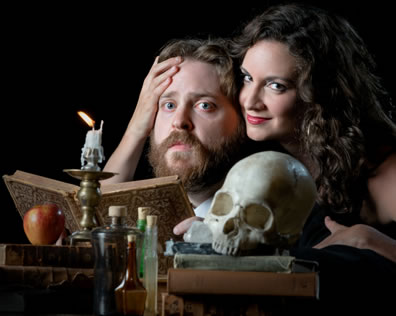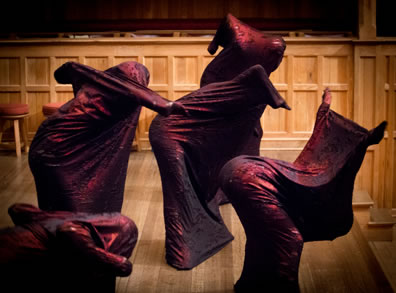Doctor Faustus
Teaching an Old Marlowe with New Tricks
By Christopher Marlowe
American Shakespeare Center, Blackfriars Playhouse, Staunton, Va.
Saturday, September 6, 2014, C–4&5 (front middle stalls)
Directed by Jim Warren

Andrew Goldwasser as Faustus and Stephanie Holladay Earl as Mephistopheles in Doctor Faustus. Photo by Michael Bailey, American Shakespeare Center.
Talk about a Houdini act. Heck, this show even uses David Copperfield and Doug Henning as its muses—and Lady Gaga, too. The result is that the American Shakespeare Company's Method in Madness Tour troupe not only escapes the chains of Christopher Marlowe's pedantic storytelling, it performs Doctor Faustus with such show-stopping panache and wicked magic tricks that some favor this production over the company's two finely acted Shakespeare titles.
I admit I'm not a big fan of Marlowe. I recognize his invaluable role in the evolution of theater, his pioneering blank verse as a script format, and his influence on William Shakespeare. In fact, you will hear Shakespearian echoes in some of the verses of Doctor Faustus. For example, when Faustus is granted his wish to spend a loving moment with Helen of Troy, after a kiss he says, "Give me my soul again" and kisses her a second time—a line Romeo perhaps recalled when he and Juliet pass his sins back and forth through their first kiss.
Still, with Doctor Faustus, Marlowe is more about showing off his university wit and academic props than he is about constructing engaging plots, creating emotional drama, and presenting multidimensional characters. The title character of Doctor Faustus, gamely played by Andrew Goldwasser, is a profoundly two-dimensional character: he is either driven by his pride to make his deal with the devil to be the greatest scholar and sorcerer on earth, or he is driven by his guilty conscience to fear eternal damnation. He jumps from one dimension to the other, the battle within his soul being carried out like cannon fire over entrenched armies on a stalemated war front. In fact, the play features as characters the Good Angel (Susie Parr) and the Evil Angel (Josh Innerst) who occasionally come on stage to lobby Faustus one way and the other and then exit whereupon Faustus's light bulb of pride goes on in Goldwasser's expression, lighting his way onward to damnation.
The play opens with a long expository soliloquy in which Doctor Faustus tells us why he chooses to follow necromancy over other academic disciplines. This lecture finally yields to the professor negotiating with Mephistopheles and, ultimately, Lucifer over the big deal: Faustus gets 24 years of ultimate power on earth; Lucifer gets Faustus's soul. And what does he do with all this power? He plays stupid practical jokes on people. Really? And what do politicians seek from his powers? They ask him to bring forth ancient heroes like Alexander the Great and Helen in dumb shows. That's it? Too soon his 24 years are up, Faustus faces his final fate, and the moral of the story is played out in graphic detail (Faustus literally descends into hell).
What the play itself lacks in dimension, the actors and the sure-handed direction of ASC Co-founder and Artistic Director Jim Warren make up for in talent and stagecraft. This company, even in its home base of the Blackfriars Playhouse, aims to replicate the staging conditions of Shakespeare's own company. That means no electronics or computers for its special effects. The troupe itself creates creepy sound effects with cellos, percussion, vocals, and other noisemaking devices backstage. Demons are played by members of the troupe (we can't see their faces) covered in tight-fitting, maroon, moth-eaten sheets given form by gesticulation.
When Faustus cuts his arm for the blood that he needs to write out his contract with the devil, people in the audience squirm. When that blood in the bowl erupts in flames, jaws gape. When the tattoo appears on Faustus's arm—and, I swear, that tattoo was not there minutes earlier—I went "whoa!" When Mephistopheles turns herself into Helen of Troy, Stephanie Holladay Earl—in glittery red minidress and black knee-high boots—does a striptease right before our eyes: First she pulls off her long, black, hooded leather cloak, then she unzips her miniskirt to reveal, huh? a floor-length, white Grecian gown. And the manner in which Faustus descends into hell is so magically effective it requires a spoiler alert.
The acting, though, is no illusion. This is, pound-for-pound, one of the strongest ASC touring troupe companies in years. Goldwasser does most of the heavy lifting in this play, but this is no Volkswagen Beetle he's hoisting: this is a bus carrying a full NFL team with all its equipment, including the weight room. Oh, and it's a marathon of a role, and Goldwasser makes it to the finish line with his character fully intact. Holladay Earl takes a seductive approach to her role as Mephistopheles. OK, her outfit could get many men to trade in a soul for some of that power play action, but she wraps Faustus around her little finger through her slyly doting expressions and gliding moves.
You want scary, look no farther than Lucifer. Patrick Earl exudes confident danger in his glitzy pimp of a Satan. When Faustus, as his eternal damnation is approaching, speaks another long soliloquy regretting his choice to trade in his soul for mastering necromancy, Earl's Lucifer sits on the table behind Goldwasser, watching. The fiery focus of his eyes, his confident expression, his relaxed posture, his very silence make Earl's Lucifer, in turn, so riveting. On this tour, Earl is exemplary in the title role of Hamlet and as Benedick in Much Ado About Nothing, but acting the hell out of merely sitting there is the height of his craft. I would encourage anybody attending this production to keep an eye on Earl with the caveat that you'll have nightmares after.
Registering many noteworthy performances is Patrick Poole, playing all manner of old men, illusions, and passersby, and his turn as Robin the Clown turns what could be little more than archaic badabooms into truly comic moments shared with Dick (Tim Sailer). The clown scenes have no connection to the Faustus plot; rather, they serve as a thematic counterpoint to the Faustus story. While the academician most desires universal knowledge (Faustus spends a lot of time asking Mephistopheles to describe various realms, knowledge he can't read in books—really?), Robin and Dick use their rudimentary skills with magic to get drunk and seduce women (hello!).

The demons rehearse for the American Shakespeare Center's touring production of Doctor Faustus. Photo by Jay McClure, American Shakespeare Center.
However, Poole attains the play's highest point on the laugh meter as Gluttony during the presentation of the Seven Deadly Sins to Faustus. The meter's needle quivers in the red zone throughout this scene as, one by one, these characters emerge, each a hilarious hoot in the way they show off their particular characteristics: Sailer as Pride, Ben Gorman as Covetousness, Stephen Brunson as Wrath, Alexandra Leigh as Envy, Josh Innerst as Sloth, and Susie Parr as Lechery. Poole's Gluttony masticates on words as ravenously as he does on the food in his hand: a Twinkie.
Sarah Strange deserves special props in this scene as the production's costume designer, dressing each specter according to his or her specific sin. Except for the visions (historical or supernatural) and the modern clothes of Mephistopheles and Lucifer, Strange dresses the play in late 19th century fashions, with work-a-day clothes for the servants, frock coats and vests for the academics, and military uniforms for the rulers. She is also responsible for two of the show's most effective illusions: Mephistopheles undressing into the fully dressed Helen, and Faustus's descending into hell. For the latter, those gesticulating sheets serving as Lucifer's demons move onto the stage and surround Faustus, completely obscuring him from the audience as he screams in tormented pain. His cries fade, the demons disperse, and Faustus has vanished. A murmur of disbelief ripples through the audience, and it's not until the curtain call when the demons disrobe to take their bows that people realize what had become of Goldwasser.
This troupe is not only rich in thespian talent and illusionist skills, it is a dynamite musical act. For all three of the company's plays on this tour, make sure you get in a half-hour before showtime, when the preshow concert starts, and stick around through the intermission. These guys do Shakespeare right, and make Marlowe good, too; yet I have no qualms saying that their musical performances rival the theatrical performances, even in the Shakespeare plays. For Doctor Faustus, they rock out (all acoustic, but still rocking) with AC/DC's "Highway to Hell" and prompt a sing-along with Norman Greenbaum's "Spirit in the Sky." And if not for Gluttony's gluttony, the evening's highlight would be the all-male, a-cappella version of Lady Gaga's "The Edge of Glory." Now that is magic.
Eric Minton
September 18, 2014
Comment: e-mail editorial@shakespeareances.com
Start a discussion in the Bardroom



 Find additional Shakespeareances
Find additional Shakespeareances